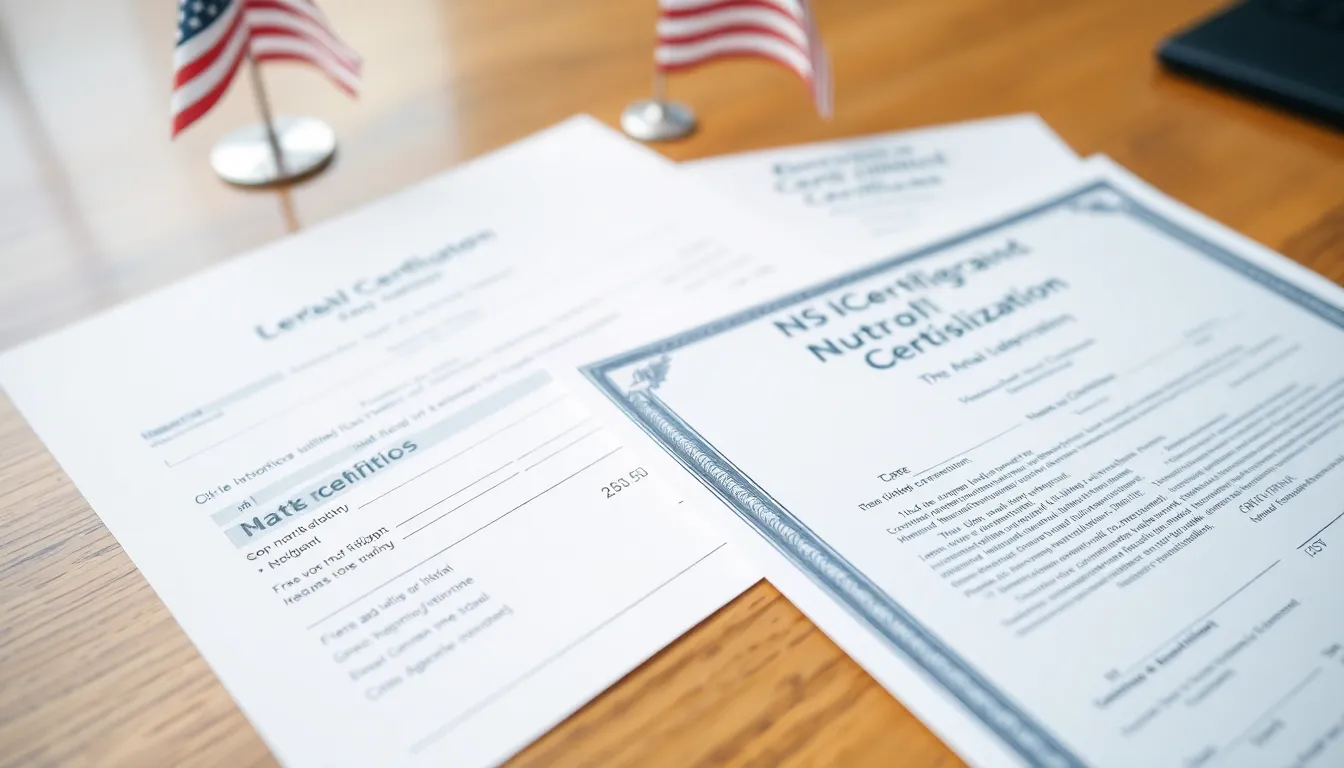Navigating the world of U.S. citizenship can feel like trying to solve a Rubik’s Cube blindfolded. But fear not! Understanding what constitutes proof of U.S. citizenship is simpler than it seems. Whether you’re applying for a passport, enrolling in school, or just trying to impress your friends at trivia night, knowing the right documents can make all the difference.
Proof of citizenship isn’t just a fancy term; it’s your golden ticket to a world of rights and privileges. From birth certificates to naturalization certificates, these documents are your backstage pass to everything America has to offer. So buckle up and get ready to explore the essentials of proving your citizenship—because who doesn’t want to be a proud card-carrying member of the U.S.A.?
Table of Contents
ToggleOverview of Proof of US Citizenship
Proof of U.S. citizenship encompasses various documents that establish an individual’s status as a citizen. Commonly accepted forms include birth certificates, U.S. passports, and naturalization certificates. Each of these documents serves a unique purpose in verifying citizenship.
A birth certificate provides immediate citizenship evidence if born in the U.S. This document typically includes the individual’s name, date of birth, and location of birth. A U.S. passport not only confirms identity but also proves citizenship when traveling. Holders of valid passports aren’t required to present additional citizenship documentation.
Naturalization certificates are essential for individuals who acquired citizenship through the naturalization process. They formalize the transition from permanent resident to citizen, including the individual’s name and naturalization date.
Other documents can support citizenship claims. Voter registration cards, military records, and Social Security records may serve as supplementary evidence. Applicants should ensure these documents align with official recognition guidelines for citizenship.
Understanding these proofs enhances access to rights afforded to citizens, impacting daily tasks like applying for jobs and government benefits. Proving citizenship often involves presenting these documents to various institutions, making familiarity with requirements vital for navigating bureaucratic processes.
Types of Citizenship Documents

Various documents establish proof of U.S. citizenship, each serving specific roles. Familiarity with these documents can aid significantly in accessing essential services.
Birth Certificate
A birth certificate serves as one of the fundamental forms of citizenship proof. For individuals born in the United States, this document provides immediate, official evidence of their citizenship status. It includes vital information such as the individual’s name, date of birth, and place of birth. Issued by state vital records offices, the birth certificate remains the primary document for many applications, including those for passports and social security. Accessing a copy typically requires contact with the relevant government agency in the state of birth.
Naturalization Certificate
The naturalization certificate formalizes the transition from permanent resident to U.S. citizen. Upon completion of the naturalization process, individuals receive this document as confirmation of their citizenship status. It includes critical details like the citizen’s name, date of birth, and the date of naturalization. The U.S. Citizenship and Immigration Services (USCIS) issues these certificates, emphasizing the official nature of citizenship granted through the naturalization process. Presenting this certificate is essential when applying for government jobs or asserting rights as a citizen.
Importance of Proof of US Citizenship
Proof of U.S. citizenship holds significant value across numerous aspects of life. Such documentation ensures individuals can access essential benefits provided by the government.
Access to Benefits
Accessing benefits like healthcare, education, and social services often requires proof of citizenship. Government programs, including Medicaid and Social Security, have citizenship requirements to determine eligibility. Individuals must present documentation, such as birth certificates or passports, to enroll in these programs. Additionally, public education systems necessitate citizenship verification during enrollment. Citizens qualify for federal aid programs, which can offer crucial financial support for higher education. Familiarity with necessary documentation expedites the process, ensuring individuals do not miss critical opportunities.
Voting Rights
Voting rights serve as a fundamental privilege for U.S. citizens. Proof of citizenship is mandatory when registering to vote in many states, often requiring individuals to provide a birth certificate or naturalization certificate. Registered voters participate in shaping local and national policies through their votes. Accessing the ballot box relies on clear documentation to confirm citizenship status, reflecting the integrity of the electoral process. Engaging in voting sustains democracy and enables citizens to voice their opinions in critical matters. Thus, having proper proof of citizenship is essential for maintaining one’s voting rights.
How to Obtain Proof of US Citizenship
Obtaining proof of U.S. citizenship involves a straightforward process focused on gathering the right documents.
Application Process
Initiate the process by completing the appropriate application form for citizenship documentation. For a birth certificate, reach out to the vital records office in the state of birth. If seeking a naturalization certificate, submit Form N-565 to the U.S. Citizenship and Immigration Services (USCIS). After gathering the necessary documents, ensure to pay any applicable fees. Expect processing times to vary; a birth certificate may take a few weeks, while USCIS may require several months for applications. Tracking the application’s status ensures timely updates and assistance when needed.
Required Documentation
Essential documents for proving U.S. citizenship include a birth certificate, naturalization certificate, and U.S. passport. A valid birth certificate must display the individual’s name, date of birth, and place of birth. For those naturalized, the naturalization certificate serves as key evidence of citizenship status. Applicants must provide a U.S. passport if they travel or need identification. Additional documents such as voter registration cards or military records can further support claims. Always verify that submitted copies are clear and legible to avoid processing delays.
Common Misconceptions about Proof of US Citizenship
Many individuals confuse a birth certificate with a passport as proof of citizenship. A birth certificate serves as foundational proof, while a passport confirms identity during travel. Relying on only one document can lead to complications in verifying citizenship for specific purposes.
Some people believe that being born in the U.S. guarantees automatic citizenship rights. Although, it’s true for most individuals, situations may arise where further documentation is necessary, such as in cases of dual citizenship or adoption. Individuals often overlook the role of naturalization certificates, assuming they’re only relevant to immigrants. In fact, naturalization certificates are crucial for confirming citizenship status after transitioning from permanent residency.
Additionally, there’s a misunderstanding regarding voter registration. Proof of citizenship is required for registration in many states, and failure to provide it can result in denied access to voting rights. Many also think that Social Security cards serve as adequate proof of citizenship. However, while they are important for identification, they do not confirm citizenship status on their own.
Another common misconception involves the belief that any legal document can suffice. However, only specific documents established by the U.S. Citizenship and Immigration Services hold legal weight in proving citizenship. Confusion also arises from the processing times for obtaining documents; applicants frequently underestimate how long it can take to receive a birth certificate or naturalization certificate once applied for.
These misconceptions can complicate important processes like applying for benefits or enrolling in school, emphasizing the need for clarity on what constitutes valid proof of U.S. citizenship. Understanding these nuances helps navigate bureaucratic requirements effectively.
Understanding proof of U.S. citizenship is vital for navigating various aspects of life in America. The right documents not only affirm citizenship status but also unlock access to essential rights and services. Whether it’s applying for a passport or enrolling in school having the correct proof ensures individuals can fully participate in society.
Familiarity with the necessary documentation helps avoid complications and delays in important processes. By knowing which documents are required and how to obtain them individuals can confidently assert their citizenship and enjoy the privileges that come with it.



